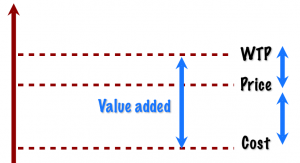Europe faces a number of interconnected problems and has, in my view, come to a crossroads which demand a fundamental choice. The crisis in Greece and the prospect of an exit of the United Kingdom are both manifestations of the situation and potentially a call to action.
The first problem facing Europe is political. The rise of new, potentially viable, political parties in Italy, Spain, and the UK and the continuing strength of Marie Le Pen’s Front National in France and Geert Wilders’ Party for Freedom in the Netherlands all point to a sense that people do not feel represented by the European and national institutions.
Willingness to Pay
 In business strategy, we use the term Willingness to Pay to talk about how customer’s value a product or service. A company increases Willingness to Pay by offering quality and also creating intangible benefits such as brand identity and sense of purpose. The difference between Willingness to Pay and cost can be thought of as a firm’s Value Added.
In business strategy, we use the term Willingness to Pay to talk about how customer’s value a product or service. A company increases Willingness to Pay by offering quality and also creating intangible benefits such as brand identity and sense of purpose. The difference between Willingness to Pay and cost can be thought of as a firm’s Value Added.
From a political point of view, we recently had a group of public broadcasters from across Europe at IESE for a program sponsored by Eurovision and the participants translated the concept into Willingness to Fund as a number of European countries are re-thinking their approach to public television and radio and television.
Their challenge is to re-think their approach to make sure their programming is relevant to today’s citizens and that they deliver that programming in an efficient way such that there is clearly value created.
Show me the Value
In my view what has happened at both the European and National level is that the mainstream political parties have not been able to articulate the compelling logic of the European project and thus the costs of that project, are seen as too high with respect to a declining perception of value.
Peace and historical prosperity are more or less taken for granted by this generation of Europeans so what they do see is increasingly onerous regulations and controls from Brussels with out a compelling Value Proposition that makes it all worthwhile.

Nigel Farage, for example, wants to take the UK out of European Institutions as he feels that Britain can negotiate her own free trade deals without Brussels and there is no compelling reason to be burdened with its rules, regulations, and refugees.

In Spain, Pablo Iglesias argues that the mainstream parties are deeply corrupt and have lost all sense of responsibility and connection with the spanish people. Candidates affiliated with his party did very well in the recent local and regional elections and have forced the mainstream parties to negotiate agreements in order to be able to govern all across the country.
Europe at the crossroads
Besides the political crisis, Europe also must decide how to deal with its demographic challenge, the immigration crisis discussed in the space a few weeks ago, geopolitical tensions around the world, and the looming climate situation.
Will Europe continue its current course of gradual action on critical issues or is there a possibility of some bolder, more compelling vision of the European project and what it means?

Business as usual, I fear, will simply not work and the election of Syriza in Greece shows what will happen when the perceived value of being part of Europe is simply not sufficient to put up with the costs of that membership. We will see over the next few days whether Alex Tsipras can walk the tightrope between his European creditors and his own party but the larger issue is about the accountability of european institutions and the vision that is being offered its citizenry.
Another approach would be to seize the moment and launch a new vision for Europe. Perhaps that vision would:
- put forward european values but allow for a massive influx of refugees and immigrants
- take a leadership position in the climate talks in Paris in December and in developing alternative energy
- stand up to aggression and tyranny in the East and all over the world with military force if needed
- change its institutions to make them more representative and transparent
Such a vision, might resonate sufficiently with the people of Europe to give them something to believe in and something they would be willing to support.


I agree with you. It is clear that EU has a lack of capability of communication, and European citizens do not receive any clear feedback from why their countries benefit being into the EU. However, in terms of diversity, the reality shows us that the European project maybe is an utopia. With almost 30 countries, a huge variety of languages, centennial cultures and a history plenty of wars… And demography will not help in the future.
Thanks for the comment! European expansion is an enourmous issue and one might say its too big already. The debate has been a broader or a deeper Europe and so far, the choice has been broad and not very deep. Is a broad Europe which actually stands for something utopian?
Mike R